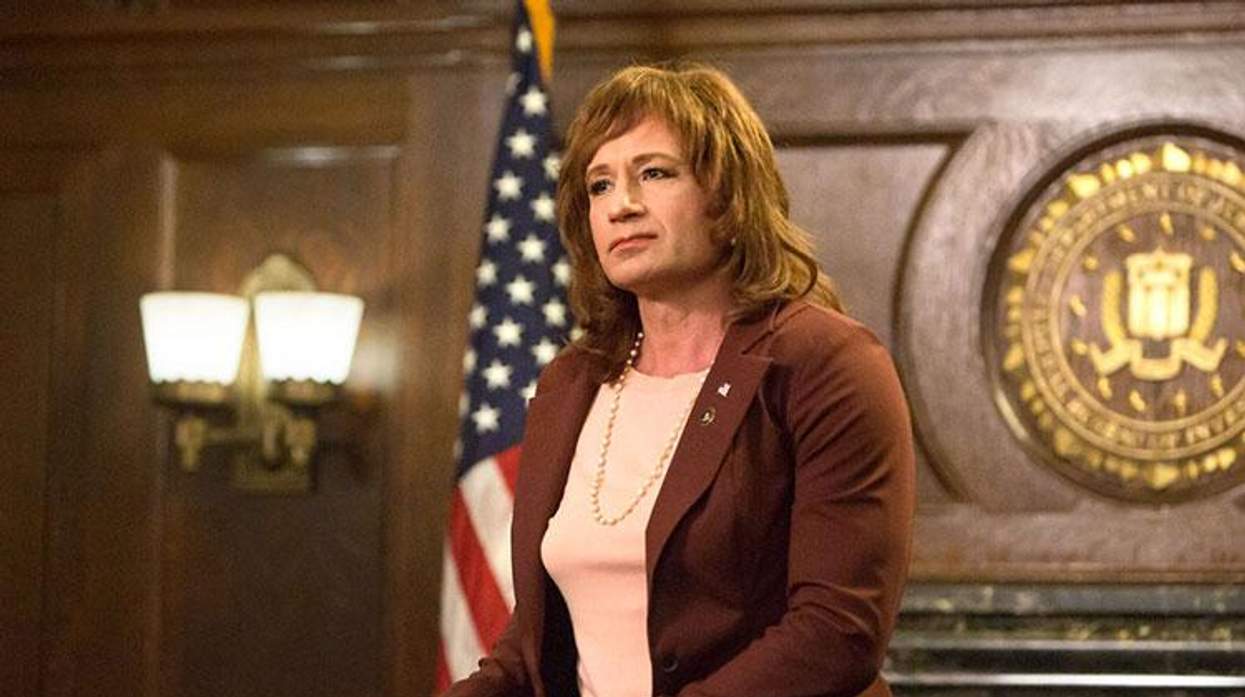Last weekend, Showtime released its hotly anticipated revival of Twin Peaks. The cult classic, created by David Lynch and Mark Frost, followed FBI Special Agent Dale Cooper's investigation into a murder linked to strange and supernatural happenings in the Pacific Northwest.
The series was beloved in part due to the peculiar cast of characters that populated the small Washington town of Twin Peaks, among them a Log Lady, a one-armed man, and a frightful apparition named BOB. Many of these characters return in the Showtime reboot, but one has stirred mixed feelings among fans: Denise Richards, a transgender agent of the Federal Bureau of Investigation played by David Duchovny.
When Denise first appeared on the ABC series in 1990, she was a trailblazer. Then (and today), trans people were practically nonexistent on network television. So to see a trans character like Denise who was smart, capable, and more than one-dimensional was a breakthrough moment for representation.
In 2017, Denise has returned to the Twin Peaks world -- and she's flourished in her career. She's been promoted to the FBI's chief of staff. Appearing in pearls and framed by a grand fireplace, she reminds her former boss, FBI Deputy Director Gordon Cole (David Lynch), of the significance of her ascent.
"When you became Denise, I told all of your colleagues, those clown comics, to fix their hearts or die," Cole replied to his onetime recruit, a tacit acknowledgement of the hard road she must have traveled.
It's an emotional moment, and one that earned the praise of The Daily Beast, which called Denise "a surprising lesson in transgender representation."
"I'm happy to report that Twin Peaks handles its only transgender character with more grace over the course of a five-minute appearance than other prestige shows and films have managed to do with hours of runtime at their disposal. Denise is not only back, she's better than ever," stated writer Samantha Allen.
Allen added, "over the span of a few minutes, we get to see something special: a female character in a position of power who just so happens to have transitioned decades ago."
However, others weren't as enthusiastic.
Jenny Boylan, a trans activist and cochair of the GLAAD board of directors, posted on social media that the scene "made me squirm."
"25 years later the David Duchovny trans character in #twinpeaks ep 4 lands really differently, made me squirm. I'm not your dancing dwarf," Boylan posted on Twitter.
The latter sentence references another character, The Man From Another Place -- a little person from the original series who would give the protagonist cryptic clues through a peculiar jazz dance. Indeed, the Twin Peaks world was populated with mysterious figures who exhibited a diversity of physical appearances, be they one-armed, or very small, or very tall.
Such representations can be positive. However, by equating Denise to the "dancing dwarf," Boylan is demonstrating that there is a fine line between advancing visibility and including a character for "shock value" -- akin to the voyeurism of a modern-day freak show.
In response to a Twitter user who defended Denise, Boylan clarified her disapproval by calling the scene a "lost opportunity."
In addition to storyline, Denise's casting is also problematic from a modern point of view. Much has changed in the decades since Duchovny, a cisgender actor, first appeared in the role. Then, such an act could be called progressive. But many argue that today, casting cisgender actors in transgender roles is tantamount to discrimination. This practice, called "transface," has been equated to "blackface." Last year, Matt Bomer sparked criticism from trans actors like Her Story's Jen Richards and Sense8's Jamie Clayton for taking the role of a trans sex worker.
Duchovny may have originated the role. But as social views change, so do the impact of representations of members of minority communities. Would a 21st-century audience have appreciated Mickey Rooney reprising his Breakfast at Tiffany's role of I. Y. Yunioshi? Likely not.
Thus, while Duchovny's role may have been groundbreaking at the time, it "has not aged well," Boylan stated.
What did you think of Denise? Leave your thoughts in the comments.




































































Charlie Kirk DID say stoning gay people was the 'perfect law' — and these other heinous quotes